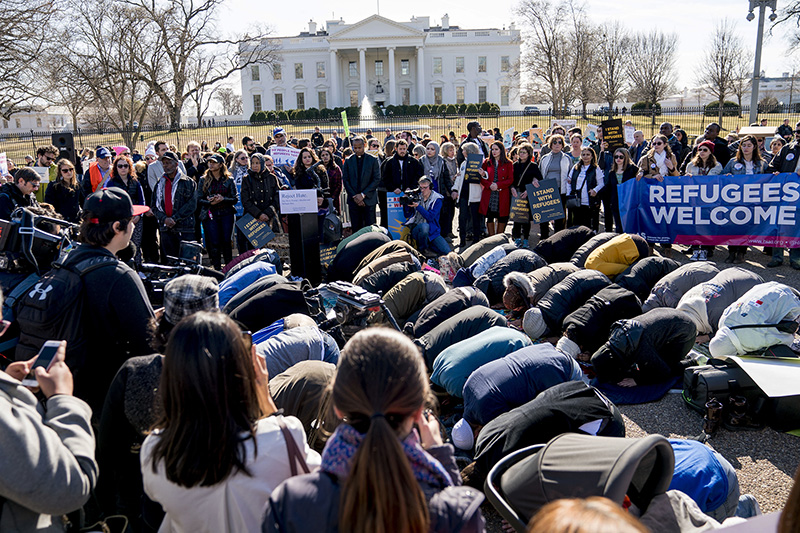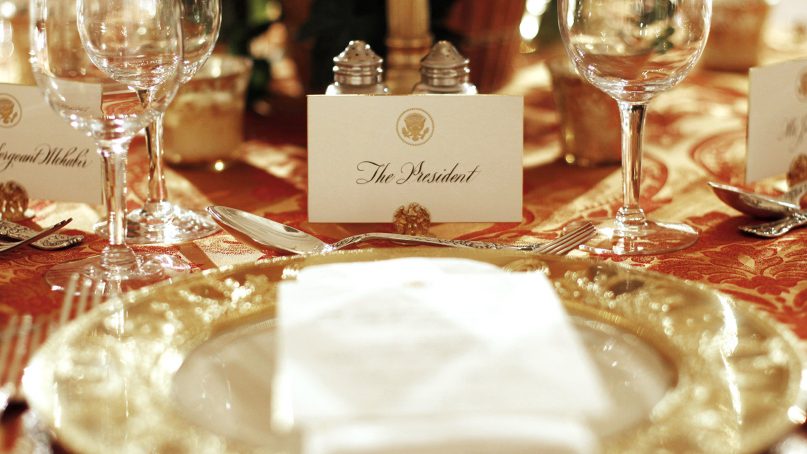(RNS) — Ramadan is a holy month dedicated to patience, forgiveness and compassion. These are all important aspects to keep in mind ahead of President Trump’s iftar.
Over the past few years, Trump created polarizing policies about Muslims, including trying to ban immigration from several Muslim-majority countries. In an interview with CNN during the 2016 presidential campaign, he infamously remarked, “I think Islam hates us.” Since his inauguration, his ever-changing cabinet always seems to have an anti-Islam presence as its one constant.
So with all this negativity towards Muslims coming from the White House, it’s difficult to see how Muslims can rationalize attending an iftar at what might be seen as the epicenter of Islamophobia.
[ad number=“1”]
But if you look a little deeper, these same concerns make it even more critical for Muslims to be in the White House during this holy time.
Pew Research Center reports that 62 percent of Americans do not know any Muslims — they may have met a Muslim, but they do not have Muslims within their social circle. Events like the White House iftar, set for Wednesday (June 6), send a message that Islam is nonetheless part of America: If they are eating at the White House, it says, Muslims not only belong here, they belong at the table.
Picture this iftar, in other words, as an antidote to Trump’s negative tweets about Muslims. Just as Islamophobic acts spike whenever Trump says something negative about Muslims, this iftar has the potential to persuade Trump supporters to engage in Islamo-friendly acts. They may even follow Trump’s example and invite Muslims to their own homes.

Supporters surround a group performing the Islamic midday prayer outside the White House in Washington, D.C., on Jan. 27, 2018, during a rally on the one-year anniversary of the Trump administration’s first partial travel ban on citizens from seven Muslim-majority countries. (AP Photo/Andrew Harnik)
Crazier things have happened. One thousand, four hundred years ago, Prophet Muhammad (peace be upon him) was pelted with stones by the people of Ta’if, near Mecca. He was run out of the city and left bloodied. But the forgiveness and patience he showed at the time ended in his being later accepted by Ta’if’s people.
Muslim Americans may disagree with many of the president’s policies. But to reject a seat at the table is to reject a chance at dialogue.
[ad number=“2”]
Engagement does not mean endorsement. It means informing Trump about all the positive things Muslims are doing in America. If I attended the iftar, I’d explain how Islamic Relief USA is pouring tens of thousands of dollars, raised primarily by Muslims, into American communities to help orphans, feed the hungry, and empower women. Likewise, my own Ahmadiyya Muslim Community USA, the nation’s first Muslim organization, has offered help to our Jewish brethren in cleaning up after graves in Jewish cemeteries were desecrated. Our youth, while fasting by day during Ramadan, have fed 50,000 hungry Americans this month.
This dialogue is not just important to have with the president, but with our fellow Muslims as well. The more than 3 million Muslims in America have plenty of differences among themselves. Seldom do Muslims ever crack their own echo chamber to come together at an intra-faith event, where Muslims meet and learn about each other. Those attending the iftar have a rare opportunity to unite their voices regarding the grievances Muslims face in Myanmar, Yemen, Syria and Gaza.
Muslim Americans have many reasons to feel rejected by the White House. But before they reject the iftar invite, they might consider the humiliations Prophet Muhammad experienced at the hands of his Meccan detractors.
[ad number=“3”]
Attempting to return home after six long years as refugees, the prophet and his companions were prevented from entering Mecca until they agreed to a very one-sided treaty, so one-sided that all of his companions advised him not to sign. The prophet signed the treaty anyway for the sake of peace.
This document, known as the Treaty of Hudaibiya, was a tipping point for Muslims as they bore up against the treaty’s unfair terms. They won over exponentially more people by their patience than by refusing to engage.
I write this not knowing who is attending the Iftar. I’m not comparing those attending to the prophet, nor am I criticizing anyone who is boycotting. Rather, I am citing Islamic precedent that the prophet engaged even those who violently persecuted him and his loved ones.
Muslim Americans should rise above bitterness against Trump and exercise this opportunity to communicate clearly what our vision is for a better America and a better world. That is what Ramadan is all about.
(Salaam Bhatti an attorney and resides in Virginia. He is the spokesperson for the Ahmadiyya Muslim Community USA, the nation’s oldest Muslim organization. The Ahmadiyya Muslim Community is a revival movement within Islam, emphasizing its essential teachings of peace, love, justice and sanctity of life.)





